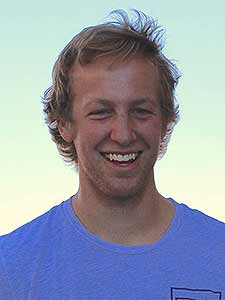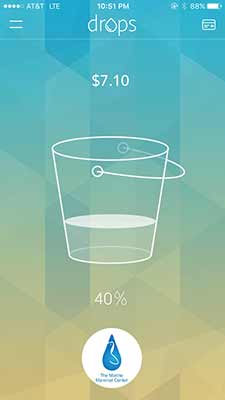
USC Dornsife student Shea Rouda develops philanthropic startup
“Buy a zombie survival kit. Buy garden gnomes. Buy shoes. Buy more shoes.”
So entreats the homepage of Drops.la, the brainchild of junior Shea Rouda. But there’s a critical second step to these entreaties: “… and donate the spare change to charity.”
Drops is a philanthropic app that allows people to round up the amount of everyday purchases they make, accruing money over time and then donating it to partner charities. The app is currently in beta mode, with around 400 users signed up and 50 actively testing the app.
Rouda, who is majoring in East Asian languages and cultures at USC Dornsife, came up with the idea for Drops last Spring and began pitching it to friends and family, looking for feedback and seed funding.
“Donating spare change is a great concept,” he said. “Nobody was working on it at the time, and it seemed like something we should do.”

USC Dornsife junior Shea Rouda.
He began developing the app in earnest last summer, doing a substantial amount of research and, thanks to an initial investment from his father, joining forces with a talented developer in India.
“I’ve always been motivated to innovate, and I love technology and wrapping my hands around entrepreneurial activities,” Rouda explained. “But I also just love the creative outlet of working on a project like Drops. It’s been a complete learning process, each new step is a completely new thing.”
Seeing the family resemblance
Rouda’s entrepreneurial spirit may in part be inherited. While growing up in Columbus, Ohio, his parents started their own real estate company and built it into a formidable corporation that was eventually sold to Warren Buffett. The family relocated to Southern California, where Rouda’s father worked as an angel investor, helping small companies get off the ground. His mother has written several books and is working to build her own publishing company.
“My parents have inspired my siblings and I to do what our hearts tell us to do,” Rouda said. “They’ve been extremely encouraging when it comes to us finding a passion versus just going with the standard route. They’d rather see us take a risk for something that we love.”
Creating a personalized experience
Drops allows its users to donate to any charity that has a direct relationship with Drops. The reason for this, Rouda said, is because donations are emotion-based transactions and he wanted to personalize the experience for donors by allowing the charities to respond to them directly.
At present, Drops is working with four organizations in the Los Angeles area — with 19 others in its pipeline.

Drops allows users of the app to round up the amount of everyday purchases they make, accruing money over time and then donating it to partner charities.
One charity, the Big Smiles Program at UCLA Children’s Hospital, collects donations for arts and craft supplies to allow young patients in the hospital to access their creativity during a difficult time.
“At the end of every month, the charity can send photos to all its donors showing how many supplies were purchased and photos of its volunteers working with the kids,” Rouda said.
Another charity, Santa Monica-based Hacker Fund, sponsors technology-related summer programs, enrichment centers, classroom education and “hack-a-thons” in which groups engage in collaborative computer programming.
“Kids from underprivileged communities can meet up and work with really nice computers and things like Oculus VR and Google Glass that they wouldn’t otherwise have access to,” he said.
Drops is also working with Amala Foundation and Camp Kawanhee for Boys, a summer camp in Western Maine that Rouda attended as a teenager.
“We try to make the focus for the organizations less about fundraising and more about making a meaningful impact with the funds they receive and then translating that impact over to our users so they can see what’s been achieved,” Rouda said.
An entrepreneurial approach to learning
Late last Fall, Rouda applied to participate in a university-wide startup competition based at USC Viterbi School of Engineering called the Min Family Challenge in Social Entrepreneurship, a donor-sponsored competition to encourage would-be social entrepreneurs to build businesses that benefit society.
Six teams were accepted and received up to $10,000 each in funding for development of their business plans during the Spring semester. Then on April 13, the teams came together to present to a judging panel and compete for another set of awards. Rouda’s team won fourth place, garnering $1,500 to continue advancing their project.
Through his USC Dornsife major, Rouda began studying Mandarin Chinese as a first-year student and enrolled in the Beijing Summer study abroad program before his sophomore year.
“I chose Chinese because I knew I’d be doing business my entire life, so I wanted to dedicate my undergrad years to studies that would be complementary without focusing strictly on business. I want to learn three languages before I pass away, so I figured I might as well go for the hardest one first!”
Learning another language has other benefits as well, Rouda said. Being able to present in front of your peers and talk to professors in a foreign language builds the confidence that’s required to reach out to businessmen, developers or charity partners to promote your app. Foreign language study also forces you to dedicate a lot of time to your pursuit and take a hands-on approach.
“That attention, focus and dedication I’ve learned is something I’ve been able to translate to Drops,” he said. “That’s been huge.”